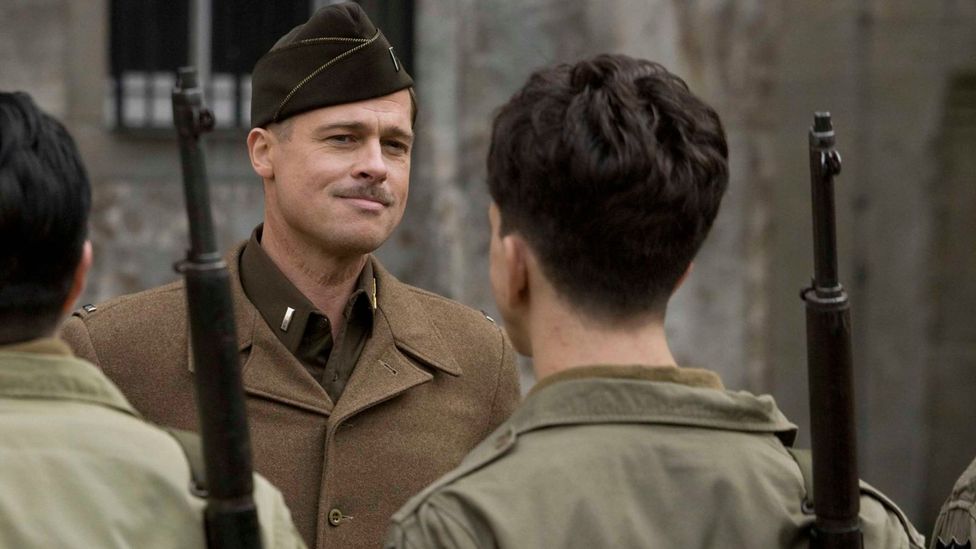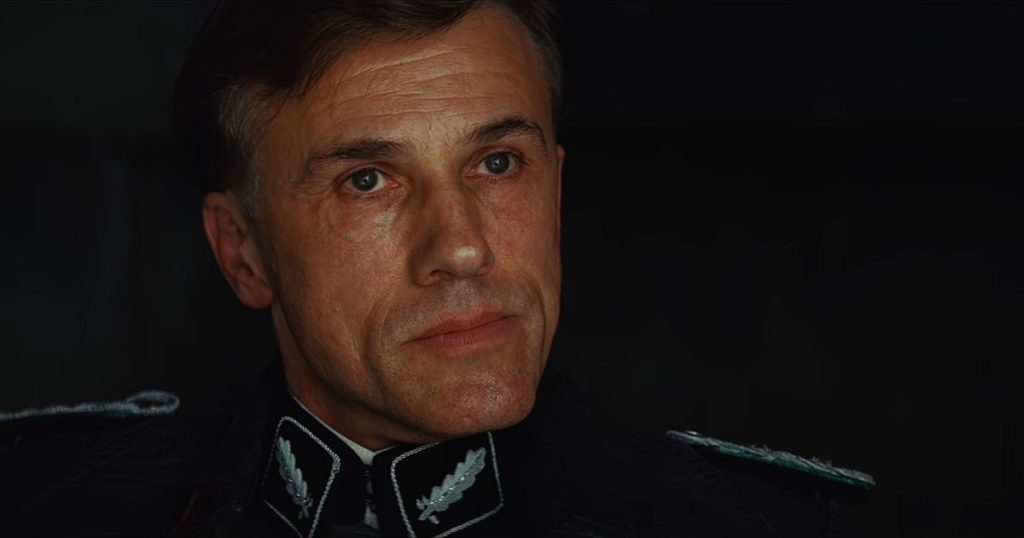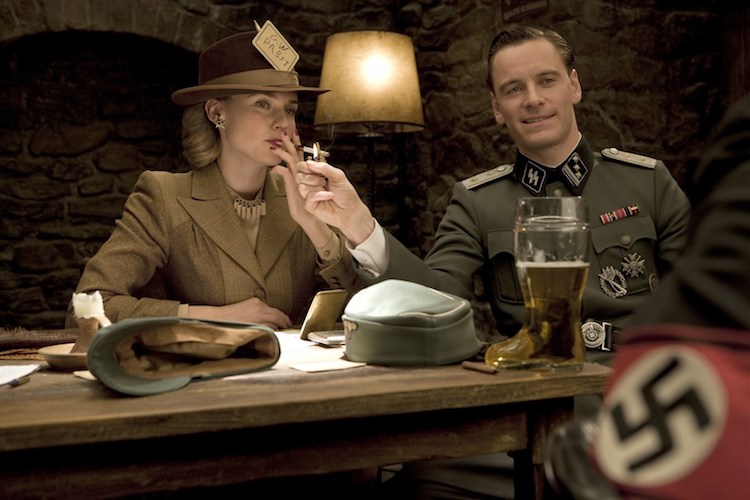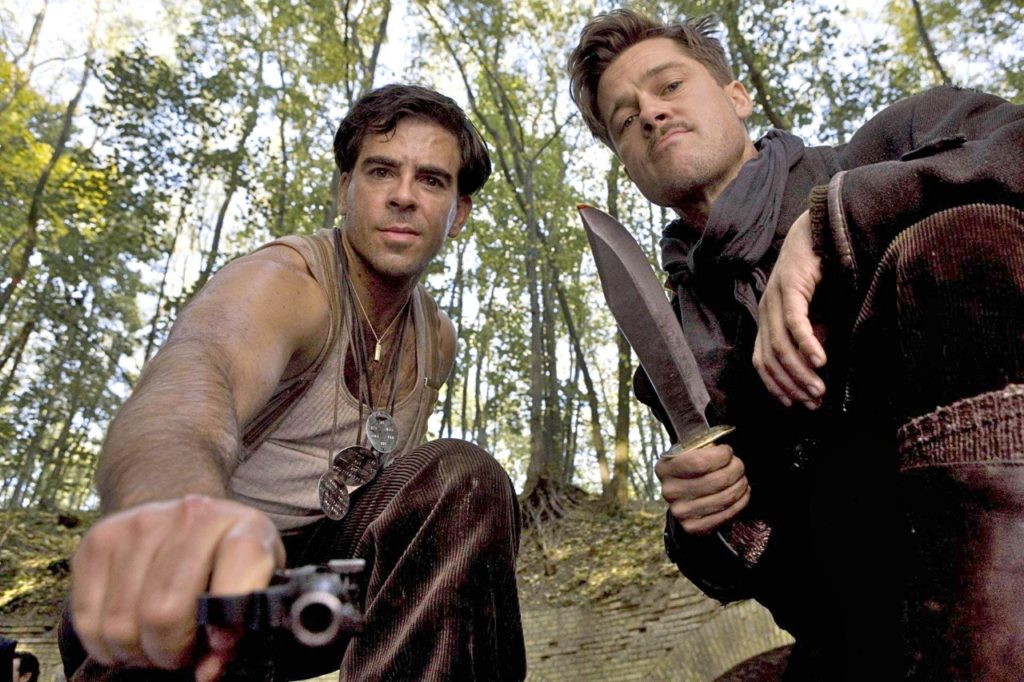| Dan Howard |

Inglourious Basterds plays at the Trylon Cinema from Friday, June 16 through Sunday, June 18. Visit trylon.org for tickets and more information.
Quentin Tarantino makes his despise for Hitler and the Nazi party well-known. The vast majority would agree. Over the last nearly 15 years, Tarantino made his own kind of historical revisionist cinema with Inglourious Basterds, Django Unchained, and Once Upon a Time in Hollywood. All have endings focused on the concept of “what should have happened”—with each ending being just as satisfying as the other.
We dive right into the horror of Nazi-occupied France when General Hans Landa, nicknamed “The Jew Hunter,” visits a family on a dairy farm and cunningly exposes the Jewish family who hide beneath the floorboards. When only one, Shosanna, escapes the massacre, we find her years later as the owner of a movie theater in Paris. When the opportunity to host the world premiere of a Nazi war propaganda film lands at her feet, Shosanna and her lover, Marcel, hatch a plot: Lock up as many Nazis into the cinema as possible and burn it to the ground; graced with the help from a rather unique team of Jewish mercenaries who hunt and kill Nazis: The Inglourious Basterds.

After the introduction of Hans Landa—a perfect villain flawlessly and intimidatingly portrayed by the incomparable Christoph Waltz—we jump right into the next chapter where the Basterds form their next plan of attack against Nazi forces. Lt. Aldo Raine (Brad Pitt) gives his soldiers a welcome speech that has since become an iconic moment in cinema. “We’re going to be doing one thing and one thing only: Killing Nazis”; “Nazi ain’t got no humanity. They’re the foot soldiers of a Jew-hating, mass murdering maniac and they need to be destroyed”; and my personal favorite line: “I want my scalps. Scalps taken off the heads of 100 dead Nazis. Sound good?!” You root for these guys—the underdogs who will prevail by any means necessary.

What fascinates me most about the film is how immense it feels while keeping the actual scale of the story relatively small and confined within lengthy, dialogue-filled scenes featuring executions that almost resemble a stage play. Even though the story runs practically three hours long, you’re so enthralled in this tale Tarantino has crafted that time simply flies by. The film itself is a deep character study in a tangled spider-web revenge tale. All of the characters are essential intricate pieces in a moving puzzle, coming together in a beautifully violent finale of the aforementioned rewritten history that also serves as a love letter from Tarantino to the essential theater experience. Without giving away too much, the scene in the theater alone immerses audiences amongst the kind of chaos that only Tarantino can create.
Just like how Sharon Tate would never have met her end at the hands of the Manson family if Rick Dalton had not been her neighbor and home that very evening in Once Upon a Time in Hollywood had, Tarantino lets his imagination run free with Inglourious Basterds, showing a history that goes the way many would have preferred in Nazi Germany. How different the outcome of WWII could have been with the existence of these characters! Maybe it would even have ended much earlier.

While witnessing Nazis meet their well-deserved fate is profoundly gratifying, one can’t help but think… How far are you willing to go for revenge? Is the destructive path worth it at the expense of your own life? In the case of Tarantino’s WWII epic, I find myself perplexed with normally not condoning violence, but simultaneously making an exception for the retribution the Basterds take into their own hands against the Nazis. Regardless, you’ll find yourself cheering for the underdogs that make up what I personally consider to be a career-defining work for Tarantino. Certainly, one that is not to me missed in-glo(u)rious 35mm.
Edited by Olga Tchepikova-Treon
